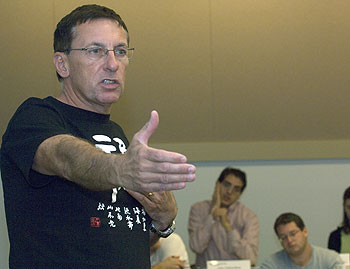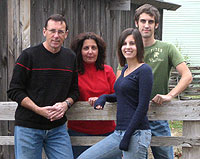The swashbuckling economist frequently instructs using a fencing foil. He keeps it safe. He doesn’t lunge or attack anyone. Instead Glenn MacDonald, Ph.D., uses the foil to engage his students in animated discussions about microeconomics or game theory or his daughter’s belly-button jewelry.

The foil wasn’t always a part of his teaching routine. It came along when he took up fencing more than 10 years ago. Like many things in his life, becoming a fencer was a seemingly random decision that became a defining aspect of his personality. In fact, if we think of MacDonald’s life as one giant decision tree, we could see that his chosen strategy is to try the unexpected, then incorporate new skills and ideas into his very being.
From the beginning, that’s how MacDonald played the game. For instance, it would have been difficult for anyone to have projected when he was a teenager that one day he would be the John M. Olin Distinguished Professor of Economics and Strategy and director of the Center for Research in Economics and Strategy at the Olin Business School.
Let’s say that we’re standing on one of MacDonald’s earliest decision nodes. MacDonald is about 12 years old and has a very poor record in school in his native Canada. No matter what he did, his grades weren’t stellar. Even the IQ tests indicated he wasn’t the sharpest tool in the shed.
“They decided I was stupid, and they were going to send me to a learning disabled school,” MacDonald recalls of his teachers. “I thought ‘OK, now I know why I don’t do well in school — it’s because I’m stupid.’ So I decided that I would do something other than school. I tried rock ‘n’ roll, started a band, and that was the path I headed down.”
Rock ‘n’ roll lifestyle
For the next 10 years, MacDonald rocked out on guitar in various bands and practically ignored school. The life worked for him for a while; he even earned money with his band, Harbour, when they played concerts around Ontario. He could have stayed on the rock ‘n’ roll branch, but instead, MacDonald enrolled in York University in Toronto, Canada.
“I just went to York because it was something to do,” MacDonald says. “It was the only place I could get in. But it was funny, because I was kind of washed up on the music scene. Rock music goes on all night, and all the people you interact with are idiots, or people stealing your gear. Everybody’s stoned and you have all these really unpleasant people hanging around. It just gets old.”
|
Glenn MacDonald Title: John M. Olin Distinguished Professor of Economics and Strategy Family: Wife, Michelle; daughter, Leigh; son, Brock Home: MacDonald lives in a piece of artwork — literally. MacDonald commissioned architect Thomas Montalto to design his home. He describes his house’s style as extremely minimalist, “two shoeboxes connected by a bridge. Its nearest relative is about 5,000 years old in Japan.” History: MacDonald became an American citizen in 2005. He embraces the American Dream. “When they say it is the land of opportunity, they’re not kidding. And that doesn’t mean just for some unwashed guy, it’s also for people like me. I was probably one of the most successful economists in Canada but I came here for a much better career.” |
It is quite possible that having unpleasant people hanging around lost its appeal because MacDonald had met a decidedly pleasant person, his future wife, Michelle. Once again, MacDonald had arrived at a node in the decision tree of his life. This time, the direction he chose resulted in his falling in love — twice.
In addition to meeting Michelle, MacDonald came into contact with an assistant profes-sor who ended up introducing MacDonald to the thrills of economics.
“I had no academic background to speak of, but this first-year assistant professor from the University of Chicago asked me to be his research assistant,” MacDonald says. “For me, this was off the scale — a completely new experience.”
The professor must have seen some potential in MacDonald that he himself had yet to discover. Perhaps it was MacDonald’s new- found fascination with math in general and differential equations in particular that prompted the young professor to give MacDonald articles on various topics in economics — articles that eventually triggered a revelation.
“I remember reading this article in March 1974 by a guy named Sherwin Rosen. I couldn’t understand it, but at the end the answer was a solution to this beautiful differential equation,” MacDonald says. “I was lying in bed thinking about that equation and I had a 15-second epiphany. At that point I knew I had to get a Ph.D., and be an economist.”
The inspiration hit so fast that it could easily be overlooked that MacDonald’s decision tree had grown a new branch.
The itinerant economist
MacDonald married Michelle and the two left their native Canada for the University of Rochester where he did, in fact, earn that Ph.D., and became an economist.
He started his career at the University of Western Ontario and later returned to the University of Rochester. In typical MacDonald style, he turned out to be anything but a run-of-the-mill economist. His focus at first was on labor economics. Soon, his interest spread to include applied micro-economics, game theory, industry dynamics, industry evolution and business strategy, to name a few. MacDonald refers to himself as an “itinerant economist.” His colleagues think of him as amazing.
“It’s rare to have someone whose research is so broad, but who has had a lot of influence in those fields,” says Barton H. Hamilton, Ph.D., the Robert Brookings Smith Distinguished Professor in Entrepreneurship. “That’s part of what makes him such a great colleague. He has a lot to say about a variety of issues, and he can discuss things with a lot of different people here.”
Hamilton notes MacDonald’s ability to talk with a range of people extends beyond his fellow professors. His students find him amicable as well — a trait that MacDonald puts thought into achieving.
“One of the greatest aspects for me of being a university professor is being around all the students,” MacDonald says. “I can see how I might be seen as unapproachable. I was senior associate dean, I run a research center, I’m a chaired professor, and I’m a generation older — do I get any less approachable than that? So, they see me in my goofy T-shirts and running shoes and they don’t think I’m so stuffy.”
In fact, it was his goofy attire that first struck Sara Wade, a former student from the Executive MBA program. While his look surprised her at first, she says he quickly proved his value as a teacher.
“His classes are at once thought-provoking and challenging and creative,” says Wade, vice-president of compensation and employee services at Peabody Energy Corp. “He weaves his research and consulting experiences into his presentations and discussions — it makes for a highly interesting class.”
Outside of the classroom, MacDonald impressed Wade with his genuine interest in getting to know his students, as well as his generosity.
“He helped me with a project for work — completely of his own accord,” Wade says. “He took a lunch hour and brainstormed ideas with me to help me solve the problem. That incident made me realize what makes Glenn stand out. Both his left brain and right brain are working at a very high level. Given his level of intelligence, you might think he’s intimidating, but he eliminates that by talking about personal experiences and foibles.”
To maintain contact with students at every level, MacDonald teaches undergraduate classes as well as instructs in the MBA and Ph.D. programs. He also is a faculty associate every year to a dorm floor of freshman; this year it is Koenig House’s third floor.
“I imagine that most of our students don’t know how great an academic reputation Glenn has because he is so approachable,” Hamilton says. “He talks to everybody. And he can really relate to a wide range of people — not just academics. I think he communicates some very complex academic research to students in a way that they find valuable. But at the same time, he could easily show up in the mosh pit at a Korn concert.”
A step ahead
That MacDonald is quite possibly one of the only professors in the business school who is on the cutting-edge of music might not surprise anyone. But it may be a shocker to learn he is probably a step ahead of the students as well. He attributes his knowledge of the latest trends in no small part to his children, Brock, a sophomore at the Olin Business School and Leigh, a high-school junior whose antics sometimes wend their way into MacDonald’s classroom instruction.

MacDonald already has had the pleasure of teaching his own son. While some might consider such an experience disconcerting, MacDonald says he saw it coming for a long time. When the Olin Business School was recruiting MacDonald from his job as a full-professor at Rochester, he insisted that the entire family have a chance to visit WUSTL and St. Louis. MacDonald says his family was hooked from the start.
“I had lots of other places I could have gone,” MacDonald says. “But really it was Mark Wrighton who was terrific with me, Michelle and the kids. He made them feel like WUSTL is where they want to be. My son has always felt that way, especially because he knows Mark, he knows the dean and he knows my colleagues. And my daughter says she won’t even apply elsewhere.”
As a result, MacDonald made his latest move on the decision tree of life and moved to St. Louis in 2001 to teach at WUSTL. MacDonald just may have reached a point of equilibrium.